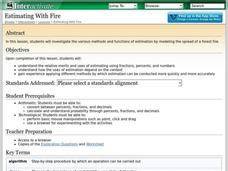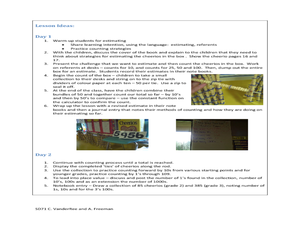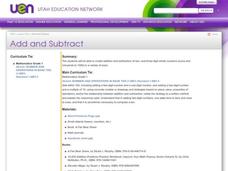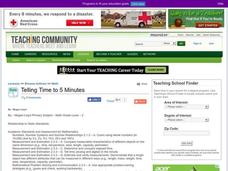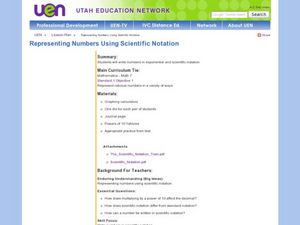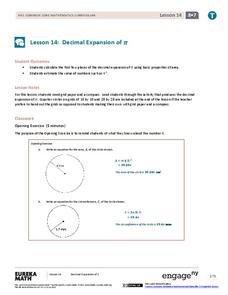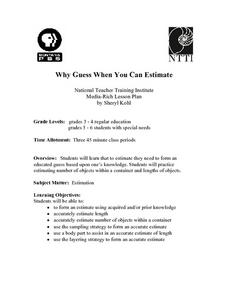EngageNY
The Decimal Expansion of Some Irrational Numbers
Develop a definition of irrational numbers through an exploration of square roots. The 11th instructional activity in this series of 25 asks scholars to estimate the value of a square root. Learners observe as the estimation extends...
Curated OER
Expert Estimators
A rich and well-designed lesson on estimation is here for you. The lesson utilizes a video; ITV Series: The Eddie Files 'Estimation: Going to the Dogs,' along with many websites. Several fantastic learning activities are...
EngageNY
Conducting a Simulation to Estimate the Probability of an Event II
Add some randomization into simulations. The 11th installment in a series of 25 presents two new methods to use in simulations--colored disks, and random numbers. Pupils use random numbers to run simulations where the probabilities make...
Ohio Department of Education
Fraction Models - Grade Three
Explore fractions using different manipulatives and illustrations. Your class can create a variety of models of fractions and mixed numbers with drawings and manipulatives. They then work to compare fractions, mixed numbers, and whole...
Shodor Education Foundation
Estimating With Fire
Watch the damage from a forest fire in this interactive simulation activity that challenges learners to estimate the burn area using different approaches. Learners are given a worksheet to track the different burn patterns and practice...
National Security Agency
Borrowing from Our Neighbors
Young mathematicians explore two-digit subtraction. They will investigate multiple ways to subtract numbers involving regrouping. Resources are provided.
Curated OER
Book Title: Great Estimations
Explore estimation with your math class. They will estimate how many Cheerios are in a box. Then count and group 50 Cheerios on a twist tie and attach groups to represent hundreds. They then discuss and practice skip counting and revise...
EngageNY
Sampling Variability
Work it out — find the average time clients spend at a gym. Pupils use a table of random digits to collect a sample of times fitness buffs are working out. The scholars use their random sample to calculate an estimate of the mean of the...
Curated OER
Add and Subtract
Like the cubs in A Fair Bear to Share, your 2nd grade class will practice adding and subtracting double-digit numbers by grouping, regrouping, and sorting a collection of objects. This requires many resources, but it is well worth the...
NTTI
I'll Halve S'more Please!
There is a lot to learn about fractions, and this is a fun way to do it! Individuals participate in a Cyberchase activity to describe a fraction in terms of sharing parts of a whole. They determine the meaning of the parts of a fraction,...
Curated OER
Estimate How Many Seeds Are In a Fruit or Vegetable
Help mathematicians estimate how many seeds are in a given vegetable or fruit. They are divided into pairs and estimate the amount of seeds in a whole fruit without seeing the inside. They then cut the fruit or vegetable in half and...
Curated OER
Estimating Solutions to Word Problems
Learners use estimation to determine the answers to word problems by rounding whole numbers. In this estimation lesson plan, pupils compare and contrast solutions using the best answer.
Curated OER
Estimating Solutions
Finding approximate solutions to word problems allows users to assess the reasonableness of their answers. In a well-paced lesson, the class rounds numbers to estimate the solutions. They explain their thinking and determine if the...
Curated OER
Telling Time to 5 Minutes
In this second grade lesson your class will practice telling time. The goal is to tell time to five minutes using an analog clock. Your young students count by 5 minute intervals and discuss elapsed time.
Curated OER
Estimate and Compare Data
Seventh graders explore the values that are used in order to describe data that is collected or given. They compare data using the statistical analysis provided by finding the mean, median, and range.
Curated OER
Whole Number Game Time
First graders play math games to develop a better understanding of whole numbers. They represent and use whole numbers up to 100. They estimate how many times they would have to roll two dice before they would get to 100 and record...
Lesson This!
Math Lesson Plan: Halloween Candy Counting
Post-Halloween learners bring in candy treats to use for counting practice. They estimate how full a bowl of candy will get when there are 100 and 200 pieces of candy counted and put in it. They take turns counting to 100 and 200;...
Curated OER
Third Grade Math
In this math worksheet, 3rd graders answer multiple choice questions about estimation, number sentences, money, and more. Students complete 25 questions.
Curated OER
Representing Numbers Using Scientific Notation
Learners explore the concept of scientific notation. In this scientific notation lesson, mathematicians discuss how multiplying by a power of 10 affects the decimal. They play Powers of 10 Yahtzee. Students roll a die five times and each...
EngageNY
Decimal Expansion of Pi
Develop a better understanding of the value of pi. Learners explore the area of a circle using estimation and graph paper. While continuing to estimate the area of the circle using smaller and smaller grids, the number pi emerges.
Curated OER
Why Guess When You Can Estimate
They apply various strategies in their estimations. They analyze the differences between guessing and estimating. They estimate the number of beans and jellybeans in egg cartons and jars respectively.
Curated OER
Measurement and Conversion of Units in a Recipe
In a cross-curricular measurement and literacy lesson, your class will identify and compare cooking measurement instruments. They read a recipe and sequence a set of similar instructions in which the steps have been mixed up....
EngageNY
Scientific Notation
Young mathematicians learn how scientific notation is meant to save time. Part 10, out of a series of 15, asks scholars to recognize the correct use of scientific notation and finish by adding and subtracting numbers using the notation.
Curated OER
Shopping Mall Math
Students interpret given data. In this mall math lesson, students identify the percent of given amounts, they estimate area, interpret data, compute percent, and examine scale drawings.






